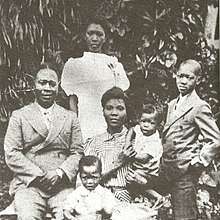Ransome-Kuti family
The Ransome-Kuti family is a Nigerian Yoruba political family noted for its simultaneous contributions to art, religion, education and medicine. The first member to bear the name Ransome, the Reverend Josiah Jesse "J.J." Ransome-Kuti, adopted it in honour of the Anglican missionary that had first converted his family to Christianity.[1] He followed his father Likoye Kuti - an Egba griot - into the musical vocation, and wrote a series of popular hymns in the Yoruba language while serving as an Anglican cleric.
| Ransome-Kuti | |
|---|---|
| political family | |
 Ramsome-Kuti family c.1940 | |
| Parent house | Oodua |
| Current region | Yorubaland |
| Place of origin | Orile Igbein, Egba Forest |
| Founded | 1830 |
| Founder | Likoye Kuti |
| Titles | List
|
| Connected families | Jibolu-Taiwo family Soyinka family |
| Distinctions | Nobel Prize for Literature Lenin Peace Prize Commander of the Order of the Federal Republic Member of the Order of the Niger |
The descendants of J.J.'s son, the Reverend Israel Oludotun Ransome-Kuti, and Chief Funmilayo Ransome-Kuti include a Health minister (who had also served as a university professor), a political activist (who would himself later be adopted as an Amnesty International prisoner of conscience), and six further musicians (including one that founded and led a political party and two Grammy Award nominees).
The Ransome-Kutis have been known to form marital unions with other families of the Yoruba elite: The branch descended from Chief Funmilayo Ransome-Kuti is a sept of the aristocratic Jibolu-Taiwo family of Egbaland by virtue of its descent from her, while the one descended from the Reverend Samuel Ayodele Soyinka, the husband of Grace Eniola Ransome-Kuti, is related to the royal family of Isara-Remo through him.
Family tree
- Olasu (c. 1750-c. 1820)
- Jamo (c.1785-c.1850) m. Orukoloku (c.1795-c.1870)
- Kuti (c.1820–c.1863) m. Anne Ekidan Efupeyin (c. 1830-July 1877)
- Eruwe Lousia Kuti (c.1857-19??)
- Josiah Jesse Likoye Ransome-Kuti (1855–1930), clergyman and the first person to use the double-barrelled family name, m. Bertha Erinade Anny Olubi (1862–1934)
- Josiah Oluyinka Ransome Kuti (1883-c.1960)
- Anne Lape Iyabode Ransome-Kuti (1885-c.1960)
- Grace Eniola Jenkins-Harrison (1908-1983) m. Samuel Ayodele Soyinka
- Wole Soyinka (1934), writer
- Grace Eniola Jenkins-Harrison (1908-1983) m. Samuel Ayodele Soyinka
- Olufela Daniel Ransome-Kuti (1887-1887)
- Israel Oludotun Ransome-Kuti (1891–1955), clergyman, m. Frances Abigail Olufunmilayo Thomas (1900–1978) (Funmilayo Ransome-Kuti), political activist
- Olikoye Ransome-Kuti (1927–2003), doctor
- Olufela Olusegun Oludotun Ransome-Kuti (1938–1997) (Fela Kuti), musician, m. Remilekun Taylor, amongst others
- Yeni Anikulapo Kuti b. 1961, dancer, m. Femi Segun
- Rolari Segun b. 1988
- Olufela Olufemi Anikulapo Kuti, b. 1962 (Femi Kuti), musician, m. Funke Kuti, dancer/music manager (now divorced)
- Omorinmade Anikulapo Kuti, b. 1995, musician
- Sola Anikulapo Kuti, (1963–1997), dancer
- Kunle Anikulapo Kuti, b. circa 1971, folk singer, m . Olufunmilayo Hastrup b. 1964
- Omosalewa Anikulapo Kuti, lawyer, m. Fehintola (1958–2006)
- Oluseun Anikulapo Kuti, b. 1982 (Seun Kuti), musician
- Motunrayo Anikulapo Kuti, b. 1980, dancer
- Yeni Anikulapo Kuti b. 1961, dancer, m. Femi Segun
- Bekolari Ransome-Kuti (1940–2006), doctor/political activist
- Enitan Ransome-Kuti, Nigerian Army officer
- Dolupo Ransome-Kuti (1922-2010)
- Frances Kuboye (d. 1997), dentist/jazz singer
- Joshua Oluremi Ransome-Kuti (1894-c. 1970)
- Susannah Olubade (1898-1898)
- Victoria Susannah Tinuade Ransome-Kuti (1899-1980)
- Azariah Olusegun Orisale Ransome-Kuti (1902–1979)
- Yemisi Ransome-Kuti (1947), current chief of the family
- Olusegun Bucknor
- Bola Soyemi
- Oluwaseun Olasupo Soyemi
- Eniola Anuoluwapo Mofoluwaso Soyemi
- Yemisi Ransome-Kuti (1947), current chief of the family
- Kuti (c.1820–c.1863) m. Anne Ekidan Efupeyin (c. 1830-July 1877)
- Jamo (c.1785-c.1850) m. Orukoloku (c.1795-c.1870)
References
- Sasom, Ian. "Great Dynasties: The Ransome-Kutis". The Guardian.
- [https://books.google.com/books? id=c4DWJLgGarsC&pg=PA19&lpg=PA19&dq=fran+kuboye,+dolupo+kuti&source=bl&ots=nagAT3VkvQ&sig=sD1H_J0oWaObcpgwgUVIFl2r5C0&hl=en&ei=yubHTOP4N5e8jAe6nrVK&sa=X&oi=book_result&ct=result&resnum=1&ved=0CBUQ6AEwAA#v=onepage&q&f=false Fran Kuboye]
Further reading
- Gibbs, James (1988). "Biography into Autobiography: Wole Soyinka and the Relatives Who Inhabit 'Ake'". The Journal of Modern African Studies. 26 (3): 517–548. doi:10.1017/S0022278X00011757. JSTOR 160896.
- Fargion, Janet Topp (12 January 2016). "The Ransome-Kuti Dynasty". The British Library. Retrieved 2018-10-18.
External links
- The Shrine The unofficial website for Fela Kuti and Afrobeat Music, with biographies of Fela, Femi and Seun Kuti.